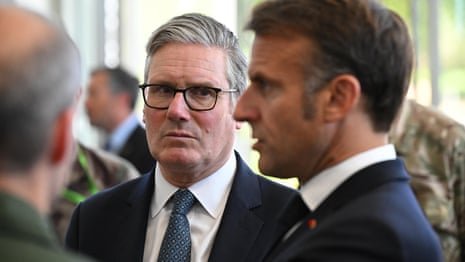‘Coalition of the willing’ agrees key parts of post-ceasefire operations and plans to ‘step up’ support to Ukraine – Europe live | Europe

‘Coalition of the Willing’ agrees key parts of post-ceasefire operations, plans to ‘step up’ support to Ukraine to put pressure on Russia
As we are still waiting for both press conferences, we have just heard from the UK on the Coalition of the Willing’s plans for further help for Ukraine after its leaders met virtually earlier today.
The meeting was joined for the first time by US representatives, including presidential envoy for Ukraine Keith Kellogg and senator Lindsey Graham.
A 3-star multinational operational headquarters of the coalition will be based in Paris, and will rotate to London after 12 months.
In case of a lasting ceasefire, the new coalition force is expected to help with regenerating and reconstituting Ukraine’s land forces, securing Ukraine’s skies with coalition aircraft delivering air policing, and supporting safer seas, particularly in the Black Sea.
The leaders also “agreed their priority effort must be to focus on Ukraine’s immediate defence in the face of relentless Russian attacks on critical national infrastructure and civilians,” the statement read.
British prime minister Keir Starmer said:
“In the coming days and weeks, we will step up our support to keep Ukraine in the fight now, increasing pressure on Putin through crippling sanctions and ensuring Ukraine’s Armed Forces have the equipment they need to defend their sovereign territory.”
He added:
I am clear that the more we do to counter Russia’s aggression, the safer we will keep the British people, our allies and the Euro-Atlantic area.
Key events
-
Macron praises coalition arrangements for Ukraine
-
‘While Putin turns back on peace, we are rallying more support for Ukraine,’ Starmer says
-
Starmer, Macron speaking at conclusion of three-day state visit
-
‘Coalition of the Willing’ agrees key parts of post-ceasefire operations, plans to ‘step up’ support to Ukraine to put pressure on Russia
-
Lithuania confirms Gerbera drone crash after flying in from Belarus
-
Starmer, Macron urge allies to step up ‘pressure’ on Putin, say peacekeeping plans are ‘mature’ and ‘ready to go’
-
Sweden’s migration minister ‘shocked’ by teenage son’s far-right activism
-
Ukraine arrests Chinese father and son on suspicion of spying
-
US ‘disappointed’ with lack of progress on Ukraine, Rubio tells Russia’s Lavrov in ‘frank’ exchange with ‘new idea’ from Russia
-
Germany’s Merz says he spoke with Trump on Patriots for Ukraine, no decision made yet
-
Lithuanian leaders briefly evacuated after alarm over airspace violation from Belarus
-
EU ‘blind’ on US intentions on tariffs deal
-
EU’s von der Leyen survives no confidence vote in European Parliament
-
Russian attacks on Kyiv overnight – video
-
Our consciences cannot rest while Putin attacks civilians in Ukraine, Poland’s Tusk says
-
‘This is war between civilisation and barbarism,’ Poland’s Tusk declares
-
‘Stay with us on this side of history,’ Germany’s Merz urges Trump
-
Germany’s Merz calls out Slovakia for delaying 18th package of EU sanctions against Russia
-
Germany ‘fully supports’ Ukraine’s plans for EU accession, Merz declares
-
Europe will be on Ukraine’s side for ‘as long as it takes,’ von der Leyen says, as she says EU ready to open accession talks
-
€10bn contracts to be signed, Zelenskyy says, as he urges to ‘keep pressure on Russia’
-
Zelenskyy urges leaders to use frozen Russian assets to rebuild Ukraine
-
Zelenskyy talks about ramping up Ukraine’s air defence, bringing abducted children back
-
‘Increase your investments when Russia increases attacks,’ Zelenskyy says
-
Daily Russian attacks on Ukrainian cities amount to ‘terrorism,’ Zelenskyy says
-
Meloni calls out Russia for increasing attacks on Ukraine
-
Ukraine Recovery Conference – live stream
-
We want to send clear message: Ukraine is not alone, Italian foreign minister says
-
Leaders arriving for Ukraine Recovery Conference
-
Russian activity made 2024 ‘one of the most challenging in modern history,’ Czech intelligence service says
-
EU’s von der Leyen faces vote of no confidence
-
Morning opening: Ukraine accuses Russia of ‘escalating terror’
Macron praises coalition arrangements for Ukraine
Macron also talks about the need to speed up bilateral UK-French cooperation on new generation of missiles and coordination on AI, space and cyberspace and disinformation.
“In a period where our countries are facing hybrid threats, this is a wide ranging toolbox to confront the challenges we are faced with,” he says.
On Ukraine, he talks the two countries share determination to keep supporting Kyiv.
He says the EU’s 18th package of sanctions “is being finalised and the Americans are preparing to impose further sanctions” too.
The French president then turns to the Coalition of the Willing (17:38), saying the arrangements agreed today mean “we will be able to hold this ceasefire and give it credibility in the air, [and] on the sea.”
“We also wish to strengthen our partnership against the Russian shadow fleet and their fight against their avoidance of sanctions,” he adds.
Macron also talk about security issues, stressing that Britain and France have a particular responsibility as the two European countries with nuclear weapons.
He warns that there are growing security risks, with threats coming not only from terrorists, but also with the consequences of a major conflict in Europe.
On nuclear, he sends a strong signal, saying:
“We don’t exclude coordinating our nuclear deterrence. This is a message our partners need to hear, and our adversaries, too.”
‘While Putin turns back on peace, we are rallying more support for Ukraine,’ Starmer says
Starmer begins by discussing all sorts of issues raised during bilateral talks with France, including on migration.
But on Ukraine, he says:
“We have just co chaired a meeting of the coalition of the willing, including representatives from the United States, for the first time.
We announced plans for a new multinational force Ukraine headquartered in Paris, so that we are ready to support a peace deal when it comes.
While Putin turns his back on peace, we are rallying more support for Ukraine right now to defend their people and force Putin to the table.”
Starmer, Macron speaking at conclusion of three-day state visit
Starmer and Macron are now speaking at a press conference together.
You can watch it below, and I will bring you the key lines here.
And for key UK news angles, including on migration in the English Channel, follow our UK live blog here:
‘Coalition of the Willing’ agrees key parts of post-ceasefire operations, plans to ‘step up’ support to Ukraine to put pressure on Russia
As we are still waiting for both press conferences, we have just heard from the UK on the Coalition of the Willing’s plans for further help for Ukraine after its leaders met virtually earlier today.
The meeting was joined for the first time by US representatives, including presidential envoy for Ukraine Keith Kellogg and senator Lindsey Graham.
A 3-star multinational operational headquarters of the coalition will be based in Paris, and will rotate to London after 12 months.
In case of a lasting ceasefire, the new coalition force is expected to help with regenerating and reconstituting Ukraine’s land forces, securing Ukraine’s skies with coalition aircraft delivering air policing, and supporting safer seas, particularly in the Black Sea.
The leaders also “agreed their priority effort must be to focus on Ukraine’s immediate defence in the face of relentless Russian attacks on critical national infrastructure and civilians,” the statement read.
British prime minister Keir Starmer said:
“In the coming days and weeks, we will step up our support to keep Ukraine in the fight now, increasing pressure on Putin through crippling sanctions and ensuring Ukraine’s Armed Forces have the equipment they need to defend their sovereign territory.”
He added:
I am clear that the more we do to counter Russia’s aggression, the safer we will keep the British people, our allies and the Euro-Atlantic area.
Lithuania confirms Gerbera drone crash after flying in from Belarus
In the meantime, we are getting a bit more detail on the unmanned aircraft reported by the Lithuanian authorities earlier (14:04).
Defence minister Dovilė Šakalienė confirmed it was a “Gerbera”, a decoy drone intended to imitate the more dangerous Shahed drones, LRT reported.
She added that there was currently no evidence to confirm if the drone was deliberately sent across the border from Belarus into Lithuania.
Gintautas Ciunis, of the Lithuanian armed forces, confirmed it did not pose a danger, but a more in-depth investigation into the incident was under way.
The aircraft reportedly flew at a low altitude of about 100 meters, at a speed of 50–60 km/h, before falling to the ground, it was reported.

Jakub Krupa
We are also waiting for Ukrainian president Volodymyr Zelenskyy’s press conference in Rome.
You can watch it with us below, but I will bring you all the key lines here.

Jakub Krupa
The two leaders will also appear at a joint press conference at the end of Macron’s three-day state visit in Britain at some point in the next hour – I will bring you all the latest here.
Starmer, Macron urge allies to step up ‘pressure’ on Putin, say peacekeeping plans are ‘mature’ and ‘ready to go’
British prime minister Keir Starmer and French president Emmanuel Macron called for more pressure in the form of fresh sanctions against Moscow to secure a ceasefire in Ukraine, AFP reported.
prime minister Sir Keir Starmer and president of France Emmanuel Macron look at screens during a joint military visit to the Allied Maritime Command (MARCOM) centre in Northwood, London. Photograph: Leon Neal/PA
“We should shift our work for preparing for peace, making it happen by forcing Putin to the table… this coordinated pressure will make a difference,” said Starmer.
Starmer also said the European plans for a peacekeeping force were “mature” after months of planning, with Macron describing them as “ready to go” once a ceasefire is agreed, PA news agency reported.
Separately, Macron also called for allies to “step up the pressure on Russia”.
Sweden’s migration minister ‘shocked’ by teenage son’s far-right activism

Miranda Bryant
Nordic correspondent
Sweden’s migration minister has said he is “shocked and horrified” after discovering his teenage son’s involvement in far-right extremist groups.
Johan Forssell, whose centre-right party runs a governing coalition that depends on the support of the far-right Sweden Democrats, said on Thursday that he had been contacted a few weeks ago by the Swedish security service, Säpo, about his 16-year-old son’s activities.
The minister decided to go public after the anti-racism magazine Expo revealed that a “close relative of a Swedish minister” was active in the violent far right.
Despite following his son on social media, where his son in turn followed far-right activists and influencers, Forssell said he had no idea about his involvement until he was contacted by journalists.
“As a father you are shocked, you are horrified. I have a deeply remorseful 15-year-old, who just turned 16,” Forssell told TV4. “These activities are over but our conversations will, of course, continue.”
Writing on social media, he said he hoped it would be an “eye-opener” for other parents, saying the findings “highlight a bigger societal issue”. “How much do we actually know about what our children do on social media and how can we protect them from being dragged into something we don’t want?”
Forssell said his son, who has not been named, is not suspected of any crime.
Far-right extremism has long been present in Sweden, but experts say recent years have seen a shift towards smaller, more agile groups, often based around fitness, recruiting boys and young men on social media platforms before moving to other private platforms. The number of active groups in the Swedish far right are believed to be at their highest point since 2008.
The last general election saw the Sweden Democrats, which has roots in neo-Nazism, become the country’s second biggest party and gain a powerful role in the direction of the governing coalition.

Jakub Krupa
Speaking of difficult relations between a father and son, let’s go to Sweden, and Miranda Bryant for a story about the country’s migration minister and his son.
Ukraine arrests Chinese father and son on suspicion of spying
Ukraine says it has arrested a Chinese father and son on suspicion of spying on its Neptune anti-ship missile programme, a key part of Kyiv’s growing domestic arms industry that is critical to its defence against Russian forces.
The announcement by Ukraine’s security service (SBU) follows assertions by Kyiv in recent months that Beijing, which has sought to project an image of neutrality, is helping the Kremlin’s war effort.
Counterintelligence officials arrested a 24-year-old former student in Kyiv after they provided him with “technical documentation” related to Neptune production, the SBU said in a statement on Wednesday.
They later detained his father, who had aimed to smuggle out the documents to the Chinese special services, the agency said. The father had been living in China but visited Ukraine to “personally coordinate” his son’s work, it added.
A Ukrainian official told Reuters the two men were the first Chinese people arrested for spying since Russia’s full-scale invasion in 2022.
China’s foreign ministry on Thursday said it was “still verifying the relevant information”.
“If Chinese citizens are involved, we will safeguard their legitimate rights and interests in accordance with the law,” a ministry spokesperson, Mao Ning, told a regular press conference when asked about the arrests.
A lawyer for the men could not immediately be reached.
— via Reuters
US ‘disappointed’ with lack of progress on Ukraine, Rubio tells Russia’s Lavrov in ‘frank’ exchange with ‘new idea’ from Russia
Separately, US state secretary Marco Rubio met earlier today with Russian foreign minister Sergei Lavrov on the sidelines of the Asean gathering in Malaysia.
Rubio told reporters after the meeting that he expressed “disappointment and frustration” to his Russian counterpart over the lack of progress on resolving the Ukraine war.
“I echoed what the president [Donald Trump] said, both a disappointment and frustration at the lack of progress,” he said, saying it was “a frank, important conversation.”
Moscow described the meeting as a “substantive and frank exchange of views.”
AFP reported that Rubio also added that Lavrov shared “a new idea” on Ukraine, without offering any detail on what it was.
“It’s not a new approach. It’s a new idea or a new concept that I’ll take back to the president to discuss,” Rubio told reporters, cautioning it was not something that “automatically leads to peace, but it could potentially open the door to a path.”
Germany’s Merz says he spoke with Trump on Patriots for Ukraine, no decision made yet
German chancellor Friedrich Merz said he spoke with US president Donald Trump about getting more Patriot missiles for Ukraine, but there was no final decision yet.
Merz said he was “in close contact with the American government, with president Trump” about plans to buy more Patriot systems and send them to Ukraine as he stressed the need to strenghten Ukraine’s air defence “in light of ongoing Russian attacks.”
“The Americans need some of them themselves, but they also have a lot of them. … It has not yet been finalised whether a delivery will be made,” he said.
Speaking at a press briefing on the sidelines of the Ukraine Recovery Conference, he also repeated his argument that Germany and Europe’s interests – on growth, free market economies, energy security and political freedom – are directly linked with supporting Ukraine in its fight against Russia.
Germany’s future is very closely linked to Ukraine’s future in this way.
Lithuanian leaders briefly evacuated after alarm over airspace violation from Belarus
Lithuania’s political leaders were briefly taken to shelters after alarm was raised over an unidentified object violating the country’s airspace from Belarus, Lithuanian media reported.
Media reports said that prime minister Gintautas Paluckas and parliament speaker Saulius Skvernelis were taken to safety as the situation was investigated. Lithuanian president Gitanas Nausėda is on a foreign trip in Ireland.
According to reports, authorities were worried that the flying object could be a Shahed drone of the type used by Russia in ongoing attacks on Ukraine.
The Lithuanian Army confirmed on its Facebook page that the object was detected at 11.30am local time. After its fighter jets were tasked with responding to the incident, the object quickly fell to the ground around a kilometer from the Lithuanian-Belarusian border.
After closer investigation, the object was confirmed as an unmanned makeshift plane – reportedly made of plywood and foam – and as not posing immediate danger.
But the head of the parliamentary defence committee, Giedrimas Jeglinskas, told Lithuanian media that a further investigation of the incident was needed to establish if it was a provocation from Belarus or Russia.
EU ‘blind’ on US intentions on tariffs deal

Lisa O’Carroll
in Brussels
The EU and the US are no closer to announcing a deal after a phone call between EU trade commissioner Maroš Šefčovič and the US trade representative Jamieson Greer, it has emerged.
The agreement in principle is expected to be a three page document outlining headline reductions in tariffs for cars, medical devices and possibly steel, in exchange for a baseline 10% import duty on all imports from the bloc and some simplification of paperwork on food imports.
Sources say the agreement is just waiting for Trump’s sign off and that did not happen last night so the call with Greer could never have delivered the deal.
It could yet come later today but the EU is blind on Trump’s announcement intentions.
The European Commission has the power to accept the deal as it is not legally binding as it is an agreement in principle, meaning there is no need for the type of show business moment granted to UK prime minister Keir Starmer when he took a call from Trump while visiting Jaguar Land Rover’s factory in England.
EU’s von der Leyen survives no confidence vote in European Parliament
Elsewhere, European Commission president Ursula von der Leyen easily survived the no confidence vote in the European parliament in Strasbourg, with 175 votes in favour, and 360 votes against. 18 MEPs abstained.




